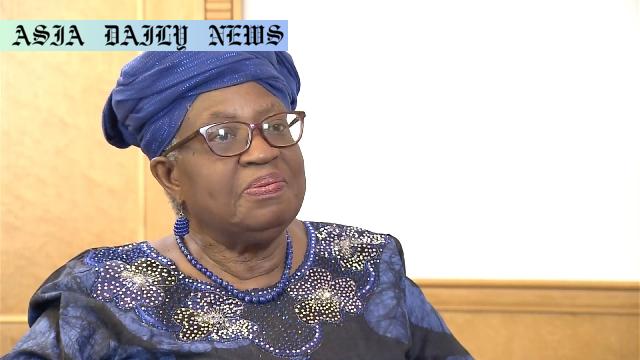Globalization – WTO chief warns against US-China decoupling, noting potential severe consequences while advocating for ‘reglobalization.’

The Role and Vision of the WTO in Global Trade
The World Trade Organization (WTO) recently outlined its concerns and aspirations concerning global economic growth and trade policies. In a statement given by WTO Director-General Ngozi Okonjo-Iweala during her visit to Tokyo, she welcomed the United States and China’s decision to reduce tariffs after productive trade talks in Switzerland. Describing this move as a ‘positive outcome,’ Okonjo-Iweala emphasized the importance of open communication channels between these two significant economic powerhouses. However, she also expressed deeper concerns about the broader implications of US tariff policies and the potential decoupling of trade systems between these nations.
This decoupling, she warned, could lead to a fragmented global trading system, which poses serious risks for worldwide economic growth. As per WTO estimates, such fragmentation could result in the loss of up to 7% of global GDP in the longer term, magnifying challenges in trade, investment, and economic stability. The WTO chief reiterated the fears among smaller nations that they may be forced to align with one side, thus limiting their opportunities for diversified trade partnerships. These dynamics represent a significant challenge to the core principles of globalization and interconnected economies.
Advocating for ‘Reglobalization’
To counteract these challenges, Okonjo-Iweala introduced the concept of ‘reglobalization,’ aiming to reshape and rejuvenate the benefits of globalization while addressing its shortcomings. She highlighted the transformative power of globalization over the past three decades. According to her, the liberalization of trade and opening of economic avenues helped lift over 1.5 billion individuals out of extreme poverty. Yet, the uneven distribution of wealth and worsening disparities between regions remain glaring issues. ‘Reglobalization’ presents an opportunity to include areas and nations that have been left behind.
Reglobalization focuses on diversifying supply chains to spread manufacturing and economic participation geographically. By deconcentrating production hubs and supply channels, nations in underrepresented regions can benefit more directly from global trade. This not only promises to alleviate economic disparity but also builds resilience into the global trade network, making it less vulnerable to localized disruptions, such as natural disasters or geopolitical tensions. Okonjo-Iweala asserts that this dual benefit makes reglobalization a superior approach moving forward.
The WTO’s Broader Agenda
The WTO’s role in fostering free trade and global economic engagement remains pivotal, but the organization is not without its challenges. Okonjo-Iweala acknowledged that globalization has faced criticism for its role in deepening economic gaps and prioritizing profits over people. The WTO’s new focus includes redefining policies that promote inclusivity while continuing to champion trade liberalization. Additionally, there is recognition that many underdeveloped nations lack the infrastructural and institutional foundations to fully participate in the global trade ecosystem. By addressing these gaps, the WTO hopes to create a fairer and more resilient economy.
Similarly, the WTO is also tackling environmental sustainability, pushing for greener trade practices. As nations debate decarbonization policies and greener supply chains, the organization sees an opportunity to align global trade goals with environmental and social objectives. By linking reglobalization with sustainability, the WTO can champion a trade structure that not only benefits economies but also supports global environmental priorities.
The Challenges Ahead
Despite its promising vision, the path forward for the WTO and its plans for reglobalization is not without hurdles. Geopolitical tensions, especially between the US and China, could undermine efforts to create a combined or inclusive trade system. With countries increasingly adopting protectionist policies, the broader support for free trade is waning. Furthermore, local economies trying to recover from COVID-19 disruptions may prioritize short-term measures over longer-term collaboration, making it harder to establish trust-driven multilateral systems.
To overcome these challenges, global leaders must work collaboratively to strike a balance between national interest and global well-being. Ngozi Okonjo-Iweala’s call for a renewed commitment to free trade, inclusiveness, and resilience bank on the hope that the global community can come together, irrespective of political divides, to carve out a more equitable future.
Commentary
The Fragility of Global Systems
In a world where nations have become more intertwined than ever before, the prospect of fragmentation should raise alarms. The remarks made by WTO’s Director-General Ngozi Okonjo-Iweala reflect the gravity of the issue. If countries like the US and China continue to be at economic odds, the global economy may bear the brunt. These two nations are undeniably vital cogs in the international trade machinery. Efforts to decouple their interaction would lead to cascading economic consequences, limiting opportunities for developing and smaller nations.
The Promise of Reglobalization
On a hopeful note, the introduction of the ‘reglobalization’ concept also highlights the WTO’s commitment to addressing ongoing global disparities. By ensuring that the fruits of globalization are more evenly distributed, reglobalization seeks to balance inequities across countries and communities. Creating decentralized supply chains, especially in under-represented regions, is a vital step. It reflects a shift from the old perception of globalization as serving only a few elite economies to creating opportunities for a more diverse global pool of participants.
Looking Ahead
What the WTO aims to achieve will require nuanced strategies. Powerful nations must be convinced to adopt policies that look beyond their immediate self-interest. This vision of trade—a more cooperative and inclusive process—requires multilateral dialogue and trust-building. The drawn-out impact of the COVID-19 pandemic on global trade only underlines the urgency for creating fail-safe, resilient systems that can better withstand unexpected challenges. If executed with diligence, this transformation catalyzed by reglobalization could very well lead to a sustainable and inclusive world economy.


